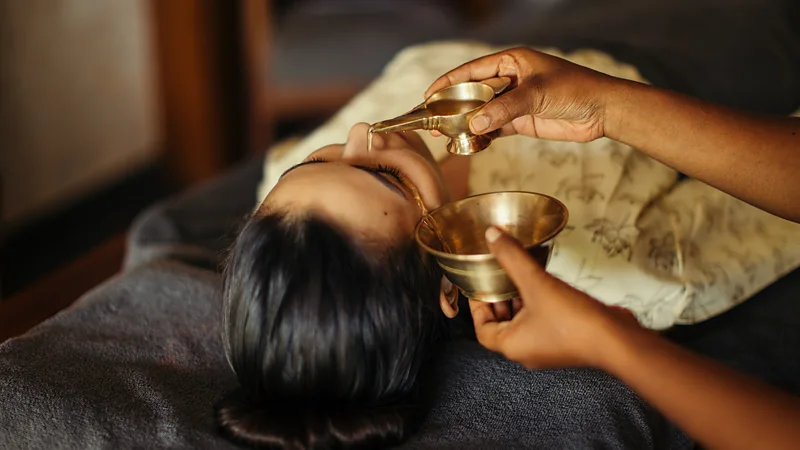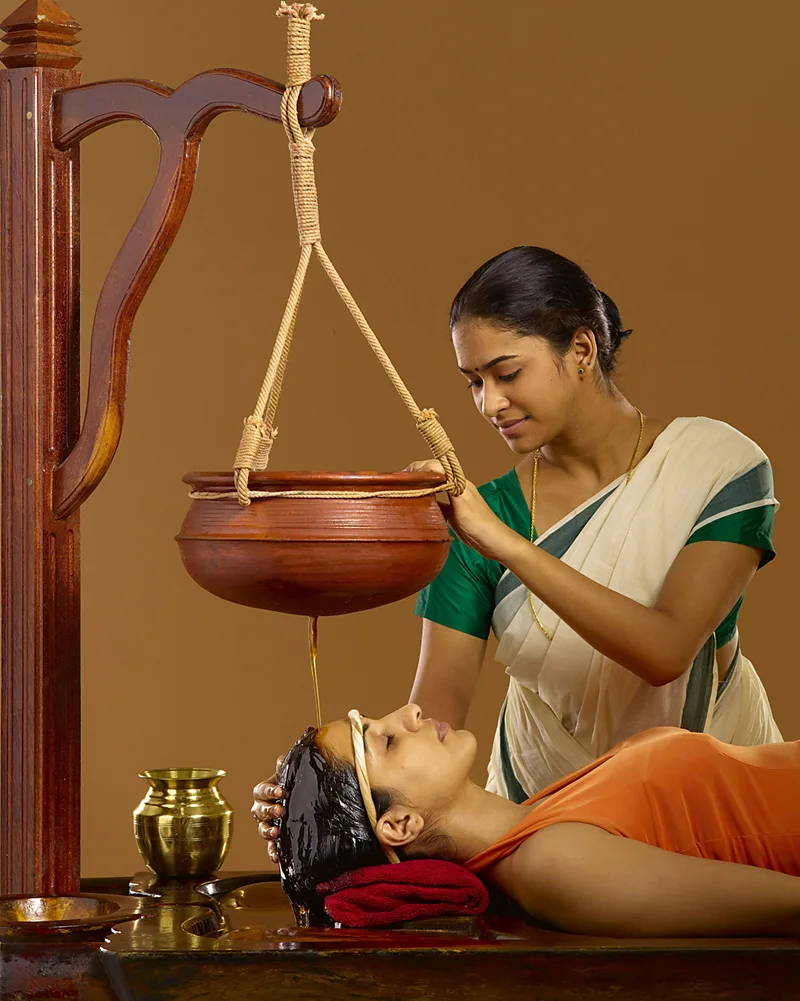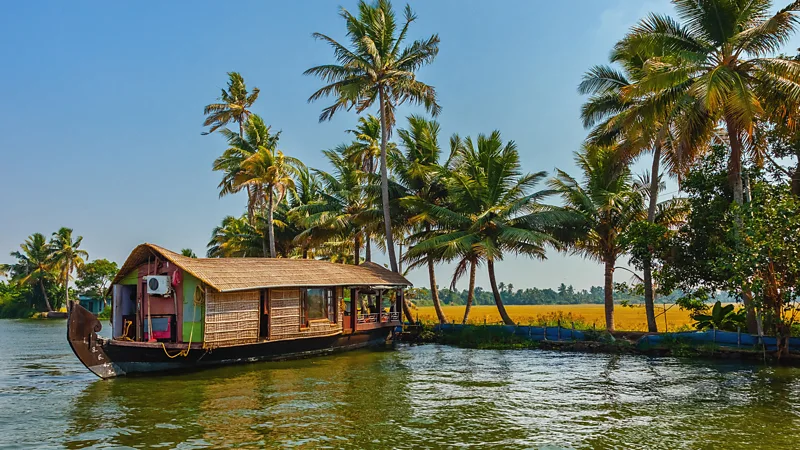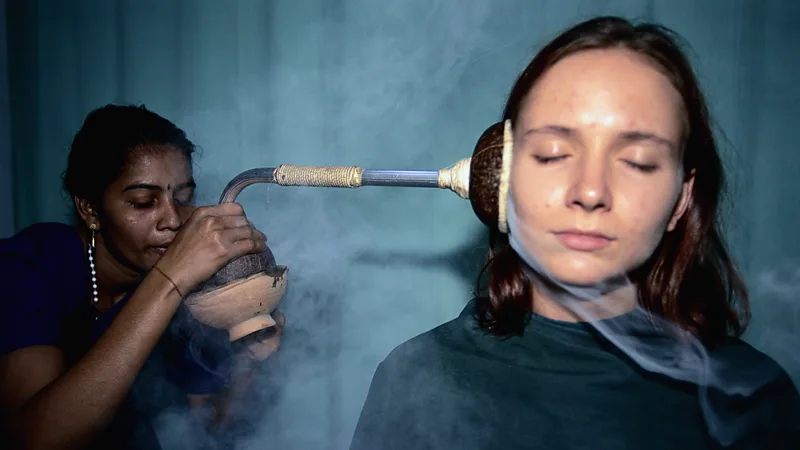India's ancient tradition that aligns mind, body and spirit – and where to experience it
 Ayurveda, which traces its roots back over 3,000 years to India, has experienced a resurgence in the southern state of Kerala. Shilpa Iyer's journey to Kotakkal, home to the renowned Arya Vaidya Sala established in 1902, epitomizes the growing interest in this ancient medical system. Completing a seven-day panchakarma regimen, a comprehensive detoxification and rejuvenation program, Iyer sought to address the toll of modern life's stresses and strains on her well-being.
Ayurveda, which traces its roots back over 3,000 years to India, has experienced a resurgence in the southern state of Kerala. Shilpa Iyer's journey to Kotakkal, home to the renowned Arya Vaidya Sala established in 1902, epitomizes the growing interest in this ancient medical system. Completing a seven-day panchakarma regimen, a comprehensive detoxification and rejuvenation program, Iyer sought to address the toll of modern life's stresses and strains on her well-being.
Panchakarma, a cornerstone of Ayurvedic therapy, encompasses a range of detoxifying treatments, herbal remedies, dietary adjustments, and wellness practices aimed at restoring balance to the body, mind, and spirit. Iyer's experience highlights the transformative effects of Ayurveda, leaving her feeling revitalized and healthier than ever.
In Kerala, Ayurveda is deeply ingrained in the local culture, offering a holistic approach to health and wellness. Rooted in the Sanskrit principles of "ayur" (life) and "veda" (knowledge), Ayurveda emphasizes the interconnectedness of the individual with their environment. It emphasizes preventative measures and seeks to maintain harmony between the body's constitution (prakriti) and life forces (doshas), which are influenced by the elemental composition of the universe.
The doshas, derived from the elements of sky, water, earth, fire, and air, manifest in different combinations within individuals, influencing their physical and mental well-being. Ayurveda's holistic approach to health underscores its enduring appeal as a timeless system of holistic healing. Ayurveda, with its origins dating back over 3,000 years to India, has seen a resurgence in Kerala, particularly in places like Kotakkal, home to the renowned Arya Vaidya Sala established in 1902. Shilpa Iyer's experience undergoing a seven-day panchakarma regimen at Arya Vaidya Sala reflects the increasing interest in this ancient medical system, as individuals seek to address the toll of modern life on their well-being.
Ayurveda, with its origins dating back over 3,000 years to India, has seen a resurgence in Kerala, particularly in places like Kotakkal, home to the renowned Arya Vaidya Sala established in 1902. Shilpa Iyer's experience undergoing a seven-day panchakarma regimen at Arya Vaidya Sala reflects the increasing interest in this ancient medical system, as individuals seek to address the toll of modern life on their well-being.
Panchakarma, integral to Ayurvedic therapy, comprises various detoxification treatments, herbal remedies, dietary adjustments, and wellness practices designed to restore balance to the body, mind, and spirit. Iyer's journey underscores the transformative potential of Ayurveda, leaving her feeling rejuvenated and healthier.
Kerala, Ayurveda is deeply intertwined with the local culture, offering a holistic approach to health and wellness. Rooted in the Sanskrit principles of "ayur" (life) and "veda" (knowledge), Ayurveda emphasizes the interconnectedness between individuals and their environment. It focuses on preventive measures and strives to maintain harmony between the body's constitution (prakriti) and life forces (doshas), which are influenced by the elemental composition of the universe.
The doshas, stemming from the elements of sky, water, earth, fire, and air, manifest in unique combinations within individuals, influencing their physical and mental well-being. Kerala's distinctive monsoon season, known locally as "oushada maasam" or "the medicinal season," holds particular significance in Ayurveda. During this time, Keralites often undergo annual rejuvenation treatments, reflecting the deep-rooted connection between nature and health in the region.
Dr. Gaurang Paneri, an Ayurveda practitioner, explains that every individual possesses the three doshas—vata, pitta, and kapha—in varying degrees, which determine their prakriti or constitution. Diseases arise when these doshas are imbalanced due to internal or external factors, often related to lifestyle choices. Ayurveda aims to restore harmony among the doshas to promote well-being.
The knowledge of Ayurveda has been transmitted through generations of practitioners across India, but Kerala stands out as its true bastion. Keralites have embraced Ayurveda for centuries, and the state government recognized its potential early on, positioning Kerala as a wellness destination as far back as 1994.
PB Nooh, the director of Kerala Tourism, highlights Kerala's unparalleled commitment to Ayurveda, describing it as the only place in the world where Ayurveda is practiced with perfection. Practitioners in Kerala typically come from families with a long-standing tradition of Ayurvedic knowledge, and the popularity of Ayurveda is evident in the widespread presence of Ayurvedic pharmacies throughout the state.
Kerala's unique monsoon season, known as "oushada maasam" or "the medicinal season," holds special significance in Ayurveda. During this time, Keralites often undergo annual rejuvenation treatments, reflecting the deep-rooted connection between nature and health in the region. Even elephants in Kerala receive special care during this season, further illustrating the integral role of Ayurveda in the state's culture and traditions.
A Holistic Approach to Wellness
Dr. Gaurang Paneri highlights Kerala's ideal environment for the cultivation of traditional medicinal plants and herbs, owing to its moist climate and fertile soil. He underscores the rich biodiversity of Kerala's dense tropical forests, which provide a plethora of herbs and medicinal plants essential for Ayurvedic treatments.
Kerala boasts an extensive infrastructure dedicated to Ayurveda, with over 100 government-run Ayurvedic hospitals, 800 pharmaceutical factories, and 800 medicine dispensaries. Additionally, the state is home to 120 holiday resorts and private wellness centers offering specialized Ayurvedic treatments.
These treatments encompass a wide range of therapeutic modalities, including kasti vvasti for back pain and inflammation, elakkizhi for musculoskeletal issues, njavara kizhi for arthritis, and shirodhara for stress relief. Many centers also provide holistic therapies addressing immunity, mental health, weight loss, skin care, sleep disorders, and various other health concerns.
Dr. Shiny Harish, an Ayurvedic doctor in Kotakkal, emphasizes the holistic approach of Ayurveda, which integrates dietary changes, herbal medicines, massage therapies, meditation, and breath exercises. Ayurvedic treatments aim to manage symptoms, restore balance, and promote overall well-being, aligning with the growing preference for preventive healthcare strategies in today's fast-paced society.
Ayurveda's Global Rise: A Surge in Wellness Tourism
 Dr. Reji Raj, a senior Ayurveda consultant, observes that the COVID-19 pandemic has heightened interest in Ayurveda, both domestically and internationally, owing to its emphasis on periodic cleansing to restore the body's equilibrium. This trend is reflected in Kerala's tourism sector, with a notable 15% increase in domestic travelers seeking Ayurvedic treatments since November 2021.
Dr. Reji Raj, a senior Ayurveda consultant, observes that the COVID-19 pandemic has heightened interest in Ayurveda, both domestically and internationally, owing to its emphasis on periodic cleansing to restore the body's equilibrium. This trend is reflected in Kerala's tourism sector, with a notable 15% increase in domestic travelers seeking Ayurvedic treatments since November 2021.
While Kerala has long been a favored destination for its natural beauty, cuisine, and ecotourism initiatives, there's been a noticeable uptick in visitors specifically drawn to wellness tourism at Ayurvedic centers. Recognizing this demand, the Indian government introduced the Ayush (AY) visa in August 2023, facilitating travel for foreign nationals seeking traditional medical treatments, including Ayurveda.
Kerala's diverse healthcare landscape, encompassing Ayurveda, yoga, naturopathy, unani, siddha, and homeopathy, underpins its appeal as a wellness destination. Ayurveda, in particular, remains a top choice among travelers seeking holistic healthcare solutions. Market projections indicate a significant growth trajectory for the global Ayurveda market, with an estimated value reaching $26.16 billion by 2032, driven by factors such as increased awareness of Ayurvedic benefits, concerns about allopathic medicine, improved accessibility, and rising disposable incomes.
Integrating Ayurveda with Nature
 In Kerala, the opportunity to combine Ayurvedic treatments with the region's serene backwaters, pristine beaches, and verdant hill stations holds immense appeal for travelers. Modern medical institutions in the state now offer specialized packages that seamlessly blend leisure with wellness, catering to a diverse range of interests.
In Kerala, the opportunity to combine Ayurvedic treatments with the region's serene backwaters, pristine beaches, and verdant hill stations holds immense appeal for travelers. Modern medical institutions in the state now offer specialized packages that seamlessly blend leisure with wellness, catering to a diverse range of interests.
Many Ayurvedic spas and resorts are nestled in picturesque and secluded locations, offering travelers not only a chance to rejuvenate through detox therapies but also curated cultural and culinary experiences. These experiences may include visits to spice farms, heritage walks, and explorations of historical sites, such as ancient churches.
Shilpa Iyer's experience with panchakarma treatment in Kerala exemplifies the holistic approach to wellness offered by Ayurveda. Immersed in the tranquil surroundings and lush greenery, she found solace and relaxation during her wellness retreat, appreciating the comprehensive detox regimen tailored to her needs.
Similarly, Neeta Ketkar's visit to an Ayurveda center in Alappuzha, known for its enchanting houseboat cruises, allowed her to address her health concerns while immersing herself in the city's scenic beauty. For Ketkar, Ayurveda's focus on treating the root cause of ailments rather than just symptoms resonates deeply, aligning with her belief in holistic well-being.
Dr. Reji Raj emphasizes that Ayurveda's ancient wisdom, which emphasizes harmony between the mind, body, and spirit, is particularly relevant in today's fast-paced world. With a growing emphasis on preventive healthcare and holistic healing, Ayurveda offers a holistic solution to address modern health challenges, including mental health issues, stress, and sleep disorders.































































